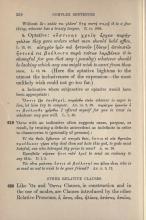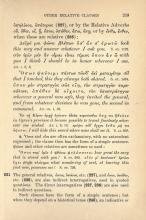620. Like Ὅς and Ὅστις clauses, in construction and in the use of modes, are clauses introduced by the other relative pronouns, ὅ, ὅσος, οἶος, ἡλίκος, ὁπόσος, ὁποῖος, ὁπηλίκος, ὁπότερος (§ 227), or by the relative adverbs οὗ, ὅθεν, οἷ, ῃ̃̔, ὅπου, ὁπόθεν, ὅποι, ὅπῃ, or by ἔνθα, ἔνθεν, when these are relative (§ 236).
Δεῦρό μοι φώνει βλέπων ὅσʼ ἄν σʼ ἐρωτῶ.
Look this way and answer whatever I ask you.
Soph. Oedipus the King 1122
σὺν ῡ̔μῖν μὲν ἂν οἶμαι εἶναι τῑ́μιος ὅπου ἂν ὦ.
With you I think I shοuld be in honor wherever I am.
Xen. Anabasis 1.3.6
Ὅσων ψαύοιμι πάντων τῶνδʼ ἀεὶ μετειχέτην.
All that I touched, this they always both shared.
Soph. Oedipus the King 1464–1465
ὅπου μὲν στρατηγὸς σῶς εἴη, τὸν στρατηγὸν παρεκάλουν, ὁπόθεν δὲ οἴχοιτο, τὸν ὑποστράτηγον.
Wherever a general was safe, they invited the general, and from whatever division he was gone, the second in command.
Xen. Anabasis 3.1.32
Ἐν τῇ Κῡ́ρου ἀρχῇ ἐγένετο ἀδεῶς πορεύεσθαι ὅπῃ τις ἤθελεν.
In Cyrusʼs province it became possible to travel fearlessly wherever one wished.
Xen. Anabasis 1.9.13
κρύψω τόδʼ ἔγχος ἔνθα μή τις ὄψεται.
I will hide this sword where none shall see it.
Soph. Ajax 658–659
a. Ὅσος and οἷος are often exclamatory, with no antecedent expressed; the clause then has the form of a simple sentence. ἡλίκος and other relatives are sometimes so used.
Ὅσος παρʼ ῡ̔μῖν ὁ φθόνος φυλάσσεται
How great the envy that is stored with you!
Soph. Oedipus the King 382
οἷόν μʼ ἀκούσαντʼ ἀρτίως ἔχει ψῡχῆς πλάνημα.
What wandering of soul, at hearing this just now, possesses me!
Soph. Oedipus the King 725–726
621. The general relatives, ὅστις, ὁπόσοs, etc. (§ 227), and ὅπου, ὁπόθεν, etc. (§ 236), are also indirect interrogatives, used in quoted questions. The direct interrogatives (§§ 227, 236) are also used in indirect questions. Such clauses have the form of a simple sentence; but when they depend on a historical tense (§ 246), an indicative or subjunctive of the direct form may be changed to the optative.
Ὅτι ῡ̔μεῖς πεπόνθατε οὐκ οἶδα.
How you have been affected (what you have experienced) I do not know.
Plato Apology 17a
ὁποίοις λόγοις ἔπεισε Κῦρον ἄλλῃ γέγραπται.
By what arguments he convinced Cyrus has been written elsewhere.
Xen. Anabasis 2.6.4
οὐκ ἔχω σόφισμʼ ὅτῳ ἀπαλλαγῶ.
I have no device whereby I shall escape. (direct: τίνι σοφίσματι ἀπαλλαγῶ; § 471.)
Aesch. Prometheus Bound 471
Ὅμοιοι ἦσαν θαυμάζουσιν ὅποι ποτὲ τρέψονται οἱ Ἕλληνες καὶ τί ἐν νῷ ἔχοιεν.
They were like people who wondered whither the Greeks would turn and what they had in mind.
Xen. Anabasis 3.5.13
a. By omission of the antecedent, ὅς and the other simple relatives become sometimes in effect indirect interrogatives.
Εἴθε μήποτε γνοίης ὅς εἶ.
Mayst thou never learn who thou art.
Soph. Oedipus the King 1068
Perhaps δέδοικα μὴ οὐκ ἔχω ἱκανοὺς οἶς δῶ (Xen. Anabasis 1.7.7) also belongs here, because μὴ οὐκ ἔχω ὅτι δῶ, a quoted dubitative subjunctive (§ 471), stands just before, in the same sentence. Cp.§ 616.a, footnote.


